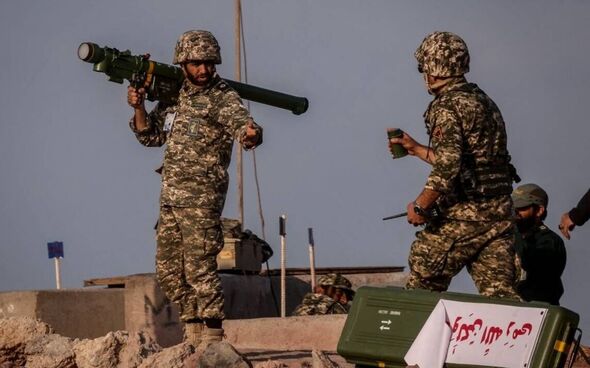Israel is on high alert and the Israeli Defence Forces (IDF) have moved troops into a newly identified “hot area” – as it prepares for a “significant attack” from Iran in response to an airstrike that killed top Iranian generals.
It comes after the IDF withdrew troops from southern Gaza ahead of a long-expected invasion of the city of Rafah. Amidst the ruins left by air strikes, 1.4 million Palestinians – mostly displaced from other parts of the Gaza Strip – scramble for food as famine looms.
Despite this, the Israeli Prime Minister has confirmed that the invasion will proceed.”It will happen. There is a date,” Benjamin Netanyahu announced in a video statement on Monday, without providing further details.
Alongside considerations about allowing IDF troops to recuperate before any possible attack, Israel faces another threat – that posed by Iran.
READ MORE: Top US General rushes to Israel as massive Iran attack threat looms
An Israeli airstrike on April 1 demolished the consulate in Syria’s capital, Damascus, killing two Iranian generals and five officers, according to Iranian officials. Among those killed was General Mohammad Reza Zahedi, who led the elite Quds Force in Lebanon and Syria until 2016, as reported by Iran’s Revolutionary Guard, says the Mirror.
Iran’s Supreme Leader, Ayatollah Ali Khamenei, has sworn that Israel “will be punished” for its “mistake” of bombing the consulate building. He condemned the “evil regime” during Eid al-Fitr prayers in Tehran, marking the end of the Islamic holy month of Ramadan.
Dr Andreas Krieg, Associate Professor of Security Studies at King’s College London, has shed light on the shifting military focus in the Middle East. He told The Mirror: “Ultimately everyone is preparing for some form of retaliation from Iran, so it’s always good to have troops outside the Gaza Strip that could be deployed somewhere else if needed. The hot area now is the northern border with Lebanon and Syria where they’re expecting some form of activity from the Iranians. So if the IDF are freeing up two battalions that’s convenient.”
In a stern warning, US President Biden has alerted the world to the potential threat posed by Iran, which is poised to launch a “significant attack” in retaliation. Speaking with gravitas outside the White House, Biden declared: “As I told Prime Minister [Benjamin] Netanyahu, our commitment to Israel‘s security against these threats from Iran and its proxies is ironclad – let me say it again, ironclad.”
The strategic relationship between Iran and the Lebanon-based militant group Hezbollah is well-known, with the latter often seen as an extension of Iranian influence despite having their own command structure. In a significant development, Israeli forces completed their withdrawal from Khan Younis, a city in southern Gaza, signalling the end of a major phase in the conflict.
Defence officials have announced plans to regroup before launching an offensive into Rafah. The Palestinian death toll from the ongoing conflict has now exceeded 33,200, with nearly 76,000 injured, according to Gaza’s Health Ministry.
The ministry does not distinguish between civilians and fighters in its count, but it does note that women and children constitute two-thirds of the fatalities.
The United States, Israel‘s strongest ally, has warned against a ground invasion of Rafah, demanding a credible strategy for civilian protection. This comes as Israeli negotiators are in Cairo to discuss international efforts to broker a ceasefire agreement with the Palestinian militant group Hamas.
Reports from Palestinians who visited Khan Younis on Monday suggest that the city is currently uninhabitable, leaving them with little immediate prospect of returning. Many have sought refuge in Rafah.
